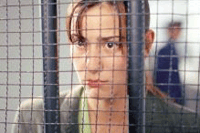My final screening in the retrospective is also coincidentally Zeki Demirkubuz’s latest feature, Destiny, a brooding and elegantly rendered film that takes on an even richer texture within the context of the creative evolution (and maturation) of his body of work. The story of Destiny proves to be an already familiar one: a shy, but […]
Tag: Zeki Demirkubuz
The Waiting Room, 2004
During the panel discussion on Turkish cinema, Zeki Demirkubuz cited Friedrich Nietzsche’s (paraphrased) statement that the more a person understands the world around him, the more isolated he becomes. This sentiment also seems to form the creative ideal for the fictional director, Ahmet (played by Demirkubuz himself) in The Waiting Room, the final installment of […]
The Confession, 2001
One of the highlights from the Zeki Demirkubuz retrospective for me was the discovery of The Confession, the second installment of his Tales of Darkness trilogy, a taut, minimalist, and deeply moving portrait of the dissolution of a marriage. A pair of mundane, quick greeting calls to the office for public works engineer, Harun (Taner […]
Fate, 2001
The first installment of Zeki Demirkubuz’s Tales of Darkness trilogy (which would subsequently include The Confession and The Waiting Room), Fate is perhaps his most fully realized adoption of themes inspired by his literary influences (and self-acknowledged personal favorite among his films to date), in this case, Albert Camus’s widely read, absurdist fiction, The Stranger. […]
The Third Page, 1999
Like Zeki Demirkubuz’s preceding film, Innocence, his equally elegant third feature, The Third Page also opens to a shot of the film’s central character, in his case, a struggling bit player named Isa (Ruhi Sari) being questioned in a private room as a broken door continues to prop open. At first, the parallel framing suggests […]
Innocence, 1997
Zeki Demirkubuz’s sophomore feature, Innocence represents a marked stylistic departure from the fragmentation and narrative asymmetry of Block-C and converges towards what would prove to be more quintessential recurring elements within his body of work: long takes, painstaking observation of temps mort, stationary camera framing, the inclusion of a hyper-extended dialogue “ellipses” (or in the […]





